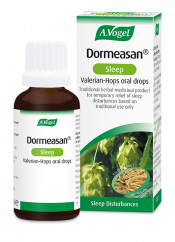1 – Working out when you should be winding down?

It’s not exactly a secret – exercise is extremely good when it comes to boosting your mood and reducing stress. It helps to increase your production of feel-good endorphins and can even support healthy sleep patterns by diminishing stress-related sleep problems. So surely that late night gym session should have left you breathless, sweaty, satisfied and sleepy?
As it turns out, no. While exercise can help to tackle underlying stress problems, having an intense session with your cross trainer before bed isn’t going to help you nod off. While working out can leave you feel physically exhausted, the chances are you’ll be mentally feeling a bit more awake thanks to adrenaline.
So what’s the solution? This isn’t an excuse to dodge those gym sessions! Overall, exercising can help to keep you fit and healthy and will benefit your sleep. Instead, try to avoid doing an intense session up to an hour before bed and focus on calming, relaxing activities in order to give yourself a chance to wind down.
2 – Spending too much time trying to count sheep?
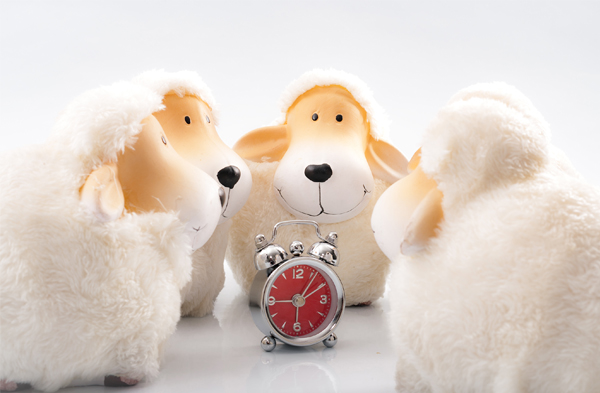
You wake up in the middle of the night and can’t get back to sleep. The odds are you’ll lie there for quite a while, getting more and more infuriated that you’re not nodding off. Why can’t you just go to sleep? When will it happen?
This pattern of thought can be toxic, though, at least for your sleep pattern. The more time you spend tossing and turning in bed, becoming increasingly more desperate, the more likely you are to stay awake. This is because you may end up triggering a stress response that stimulates the release of hormones such as cortisol and adrenalin – not at all conducive to a good night’s sleep!
So what’s the solution? If you’ve been tossing and turning in bed for more than 20 minutes it might be time to get up. If you stay where you are you might start to associate your bed with negative emotions, which won’t exactly help when you try to nod off the next night. Instead, get up and move into another room for a few minutes.
Now this move isn’t an excuse to have a late night Netflix binge or a social media scrawl – instead try to calm yourself down by practicing relaxation techniques such deep breathing or mindfulness.
3 – What about your hydration?
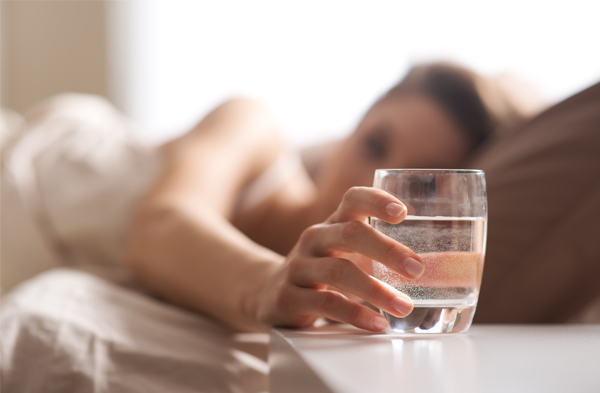
Frightened of drinking too much before bedtime in case you need to visit the toilet during the night? This is a common worry and while I wouldn’t necessarily recommend guzzling a pint of water before bed, what doesn’t get discussed enough is how dehydration can affect your sleep.
During the night you will naturally lose fluids either simply by breathing or sweating. This is normal, however, if you go to bed not having drank enough liquid during the day you are going to suffer. You may feel fatigued and exhausted but you’ll find it difficult to get to sleep as dehydration can affect your production of melatonin – after-all, if your body is dehydrated then so is your brain!
Not to mention you won’t be able to get the same quality of sleep, particularly deep sleep, as dehydration can sometimes cause inflammation, signalling to your brain that you might be in danger so you’ll be kept in a lighter sleep. Dehydration can also affect how your body temperature is regulated and in some cases, you may even experience an episode of snoring as your mouth and nasal passages will become dry.
So what’s the solution? As I mentioned, downing a pint of water before bed might not be the best answer. Instead, try to drink water regularly throughout the day – around 8 glasses – and try to avoid caffeinated beverages or fizzy drinks which may dehydrate you.
4 – Enjoying your lie-in a little too much?
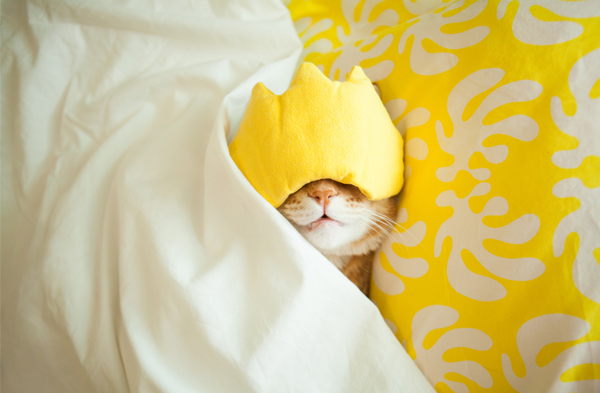
If you read my blog, ‘Are your weekend lie-ins really helping you to catch up on sleep?’ you’ll know that snoozing the day away on Sunday isn’t the best tactic for trying to catch up on lost sleep and might make you vulnerable to social jet lag.
What is social jet lag? Social jet lag refers to a misalignment between biological and social time. For example, if you spend 5 days out of your week getting up regularly at 7am, your body will gradually become ingrained into this routine. That’s why, when you keep odd hours over the weekend, you might find it difficult to nod off on a Sunday night.
So what’s the solution? The solution for this one is simple – try not to deviate too far from your usual routine. The odd late Saturday night isn’t going to affect your sleep routine too drastically, but if you spend every Saturday staying up until 3am and then getting up at midday you’re going to notice the effects. Instead, try to keep some sense of regularity – you’ll thank yourself when it comes to Monday morning again!
5 – Setting your alarm clock to snooze a little too often?
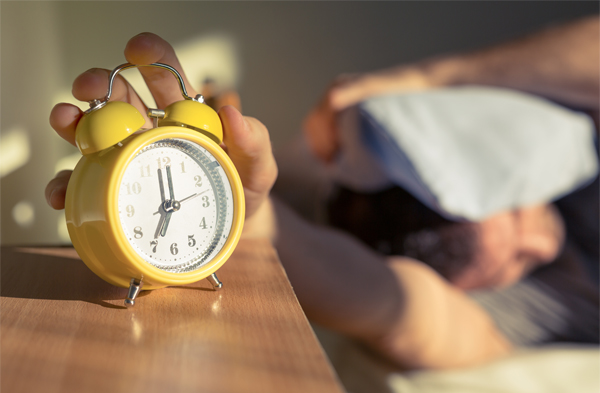
Most of us think we wouldn’t be able to survive without our trusty alarm clocks. After- all, they make sure we get up in time for work and you can always just hit snooze if you think you’ve got enough time for another 5 winks. The problem is, hitting snooze isn’t giving us the reprieve we think it is.
As I mention in my blog ‘Wakey, Wakey, it’s time to snooze your drockling’ hitting snooze can confuse your brain, leaving you feeling even more tired and groggy. This is known as sleep inertia and sometimes it can last up to 4 hours after you actually get up!
There’s also the possibility that you might stay awake clock watching if you do wake up during the night. If your eyes briefly flutter open at 4am, you might look at your alarm and panic, thinking you only have 2 hours of sleep left. This in turn can make you more anxious to get back to sleep which leads us back to our second point on this list.
So what’s the solution? If you do wake up during the night, don’t immediately turn to your alarm clock or your smartphone to gander the time and, as much as it may irritate you, when your alarm does go off in the morning, get up instead of hitting snooze. Alternatively, another type of alarm clock has made waves recently –the Sunrise alarm clock. This device gradually wakes you up over a period of 30 minutes by emitting a natural light as well as a variety of natural sound features – a much gentler alternative compared to having some jaunty wake-up call spat out at you by your smartphone!
6 – Trying to relax with the television?
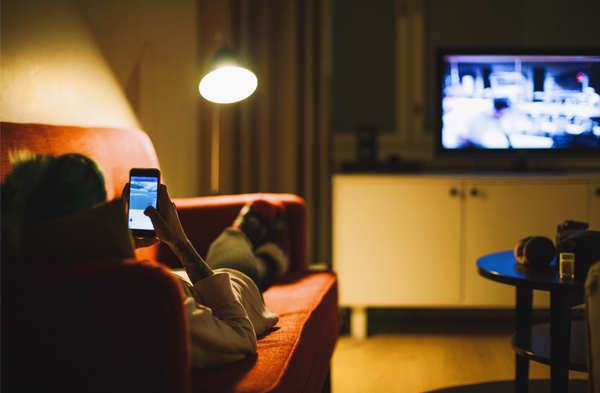
If you’re familiar with some of my blogs, you’ll know that bringing your smartphone and tablet to bed with you are a big no-no in my books. You might think that watching a funny cat video on YouTube is a great way of winding down but in actual fact, the blue light emitted by such devices is actually keeping you awake, reducing your production of the sleep hormone melatonin.
Devices aside though, most of us are guilty of lounging in front of the television until it’s time to go to bed. In the evening, it’s nice just to have some down time and a chance to catch up with your favourite programmes, however, the problem is your stress reactions.
Say you’ve tuned in to a horror film or a thriller; your brain might not be able to distinguish between what is reality and what is fiction and so may trigger a stress reaction, releasing cortisol and keeping you feeling wide awake long after the credits have rolled. You also have to consider that, like laptops, smartphones and tablets, your television also emits the same blue light that inhibits your production of melatonin.
So what’s the solution? It might not be easy, especially if you have children, but try to watch your TV programmes a bit earlier – avoid spending any time with your television at least an hour before bed. Instead, you could try to relax on your couch with a good book or divert your attention to a more restful activity.
7 – Low in nutrients?
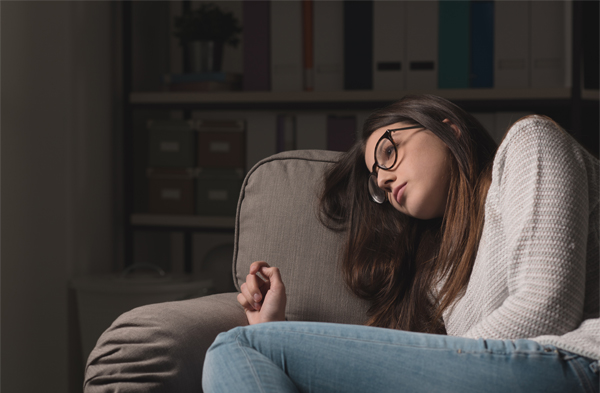
Suffering from a nutritional deficiency, such as low iron, vitamin D or B12 can affect your sleep patterns. Research has indicated that low vitamin D can affect your quality of sleep and your quantity of sleep while vitamin B12 is associated with the production of melatonin. Low iron has also been linked with restless syndrome so not getting enough of either of these nutrients can impact your sleep cycle.
So what’s the solution? Identifying whether or not you are deficient in a particular nutrient can be tricky but each deficiency is linked with a specific set of symptoms. If do have any doubts, though, it might be worth speaking to your doctor and requesting a blood test just to make sure. If you’re looking for information about how to increase your intake of any nutrients, please don’t hesitate to check out our food blogs for more information!







